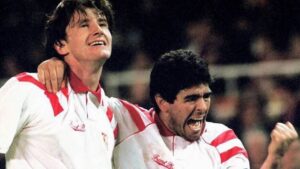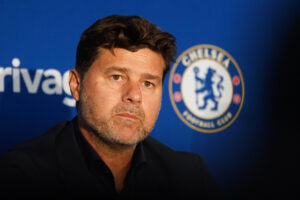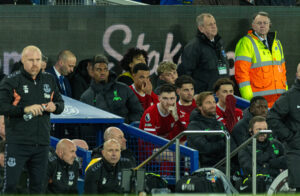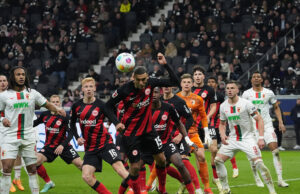Gianfranco Zola is a fairly unimposing individual. Standing at only five-and-a-half feet tall, the toothy, floppy-haired maestro could easily have been mistaken for a teenage competition winner as he stood aside a towering Ruud Gullit when signing for Chelsea in November 1996.
Two decades later, still gawky and diminutive, Zola stands amongst the giants to have shaped the Premier League era. His introduction heralds an international age that English football had yet to see.
In the process, he torched the domesticated blueprint that the Premier League had adopted in its early years. All this occurred during a seven-season period that Zola played exclusively in his thirties.
Premier League Legends: Gianfranco Zola
Gianfranco Zola: The Island Boy
Sardinian by birth, a young Gianfranco Zola spent his formative footballing years on the picturesque Italian island. He honed his skills at hometown junior side Carassi Oliena. Indeed, despite being naturally gifted with the technical imperiousness that underscored his whole career, the teenager barely crossed the radar of Italian mainland sides.
Zola spent the first five years of a career grinding a living in the lower leagues with pro sides Nuoresse and Torres. It was at the relatively late age of 23 that notorious footballing director Luciano Moggi eventually spotted Zola. He brought the island boy to Napoli in 1989.
Zola and Diego Maradona
It was a move that paid immediate dividends for the new signing scoring two goals in his first season as Diego Maradona’s centre forward understudy, as the Gli Azzurri captured their second Scudetto in four seasons. This was Zola’s first and only domestic league title.
An unlikely friendship between the quiet Sardinian and the Argentine superstar struck up; Zola quickly developed into a coveted top-level player. The two practised freekicks together hours after teammates had left their training complex. Zola admitted that it was Maradona who taught him how to put the fierce bend on set pieces that the Italian would later make his calling card.
Maradona’s drugs ban the following season ironically saw Zola thrust to the fore. Despite winning the 1991 Coppa Italia, the Neapolitans finished a disappointing seventh in Serie A; the Argentine genius bade farewell to the port city.
It would be Zola who would occupy the famous number 10 shirt he vacated. He stood out as a bright spark in a Napoli side that performed very much like they were mourning the loss of their leader. The 1992/93 season culminated in Claudio Ranieri guiding them to a lowly finish of eleventh. The club crippled by mounting debts offloaded Zola to Parma.
Continental Success
Occupying the creative trequartista role in a formidable forward three alongside Messrs Baggio and Del Piero, Gianfranco would become a globally recognisable icon during his three-season stint at the northern Italian side.
Having arrived in the summer of 1993, he had picked up the first European trophy of his career inside six months. This was under the stewardship of Nevio Scala. They added the 1993 UEFA Super Cup to the UEFA Cup Winners Cup that they had captured the previous season. Zola and Parma would contest four other major finals; this included the 1995 UEFA Cup, falling to defeat in a second Cup Winners Cup Final in 1994, as well as Coppa Italia and Italian Super Cup finals in 1995.
But league success eluded them. The 4-4-2 favouring Carlo Ancelotti replaced Scala at the start of the 1996-97 season. Suddenly, the creative number ten role disappeared and along with it, Gianfranco.
Sexy Football
Transferred to Chelsea in early November, the Italian became player-manager Gullit’s fifth transfer; he followed compatriots Luca Vialli and Roberto Di Matteo to Stamford Bridge.
The first signings of Gullit’s underscored his international brand of football; it could hardly have started better. Chelsea had become a far cry from the hardened British core that previous Chelsea managers Ian Porterfield and Glenn Hoddle had put their faith in during the early years of the Premier League era. Gullit promised “sexy football” and sexy football Chelsea fans were served, with Zola front and central.
The West Londoner’s achieved their highest Premier League position to date with a sixth-place finish in 1996/97. The club’s 26-year trophy drought also ended when clinching the FA Cup that May. The 2-0 victory over Middlesbrough at Wembley remains synonymous for Di Matteo’s record-breaking first-minute opener and being the first final where foreign players outnumbered their participating British colleagues and opponents. A galaxy of stars had emerged.
Such was the impact in his first season, that despite his November start, he won the Football Writers Association Player of the Year. To this day he is the only player to have received the accolade without playing a full season.
The Winning Habit
Zola and co ensured the trophy tap, so long stuck and unrelenting at the Bridge, remained gushing when complimenting their FA Cup triumph by capturing the League Cup and his second UEFA Cup Winner’s Cup the following season.
Forever reliable, Zola grabbed the 71st-minute winner in the final against Stuttgart, latching on to a Dennis Wise pass to half volley home only thirty seconds after being introduced from the bench. Another UEFA Super Cup medal was added when Chelsea beat Real Madrid in the pre-season glamour tie at the beginning of the 1998/99 season.
Zola, then 32, would find his minutes increasingly managed in the wake of Gullit’s acrimonious departure. Compatriots Gianluca Viall – who himself had taken on a player-manager position – and later Claudio Ranieri tended to save the veteran for European assaults. Sturdy Norweigan striker Tore Andre Flo and subsequently, the emergence of robust partners Jimmy Floyd Hasselbaink and Eidur Gudjohnsen were all more suited to what was a physical league.
Whilst the opportunity to watch the pint-sized puppeteer conduct the show in all his brilliance diminished over time, flashes of brilliance remained.
Highlights included a beautiful curling effort as Chelsea beat Barcelona 3-1 in the first leg of the pair’s 1999/00 Champions League quarter-final, setting up Di Matteo for the winner in the 2001 FA Cup final and of course, the “magic” mid-air backheel against Norwich City in Chelsea’s third-round tie the following season.
Superb Swansong
The irony surrounding Gianfranco Zola and his inclusion as a Premier League great has always invited retractors. They argue that Zola saved his eminent performances for cup competitions and the European stage.
Many argue Zola’s Premier League legacy is assured not by what he did on the field. Instead, it was his mere presence in that first cohort of foreign influx that Chelsea would frame their subsequent sides around. These are both legitimate arguments in isolation.
But those who argue his legitimacy need only point to his final season in the Premier League. Into his 37th year, Zola featured in each of Chelsea’s thirty-eight league fixtures. He scored fourteen goals and laying on another seven.
His final bow came as the Blues beat Liverpool 2-1 on the final day of 2002/03 campaign. This secured Champions League football for the following season at the expense of their Merseyside opponents.
Zola would return to Italy and finish his playing days with Cagliari in Serie A. Eventually, he called time on a glittering playing career a month shy of his 39th birthday.
The Contemporary Success of Chelsea Football Club
Led by the burgeoning English talents of John Terry, Frank Lampard and Joe Cole throughout the next decade and more, Chelsea became a Champions League staple. In fact, on only one occasion since that final day victory over Liverpool has the King’s Road side not featured in any given season’s Champions League – when they eventually won the Europa League in 2018/19.
The contemporary success of Chelsea Football Club may equitably be accredited to these players and the influence of Roman Abramovich. The Russian businessman’s investment arrived later in that same summer Zola left English shores, providing a war chest that would propel the side to six league titles.
But one cannot downplay the role Gullit’s cult of “sexy football” played in putting in place a culture of winning, of placing Chelsea very much on a continental and global map. Standing five-and-a-half-feet, Gianfranco Zola was indisputably its lead disciple.
Main Photo
Embed from Getty Images






